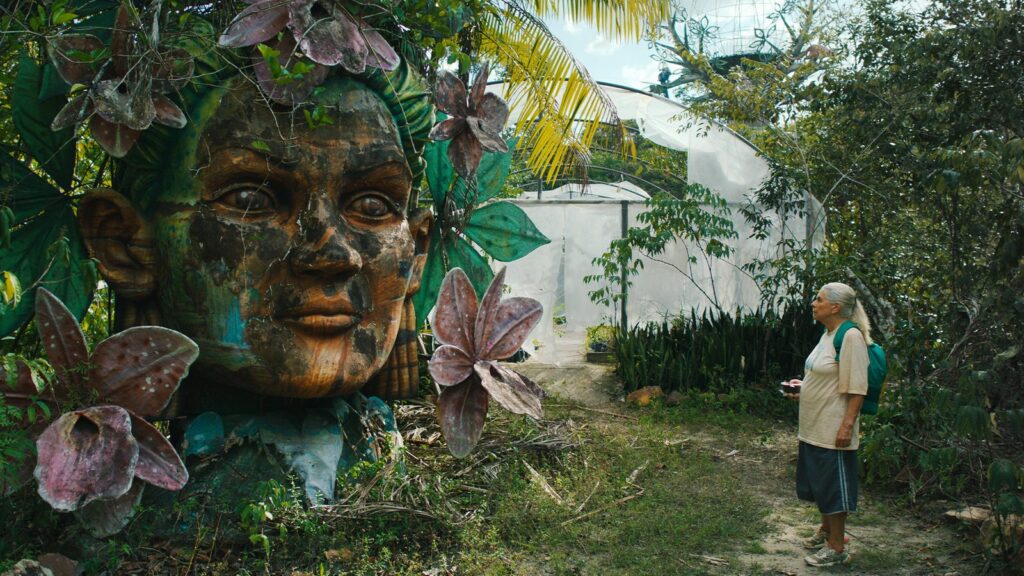Title: The Blue Trail
Foreign Title: O último azul
Year: 2025
Country: Brazil/Mexico/Chile/Netherlands
Language: In Portuguese with English subtitles
Director: Gabriel Mascaro
Gabriel Mascaro’s Blue Trail is an elusive, genre-defying film that expands the director’s ongoing fascination with the intersection of body, society, and desire. As in his previous films, Neon Bull (2015) and Divine Love (2019), Mascaro keeps exploring themes of rural labor, erotic freedom and faith set in a near-future Brazil. Here, he turns his gaze toward aging, challenging dominant cinematic narratives of old age as decline and instead suggesting late life as a site of rebellion and vitality.
The film centers on Tereza, a capable seventy-seven-year-old woman living along the Amazon River, who works in an alligator meat processing factory. The Brazil she inhabits is familiar yet distinctly altered: a dystopian system dictates that once citizens reach seventy-five, they lose their autonomy. Guardianship transfers legally to their children, their jobs are reassigned to younger workers, and they are relocated to state-run resorts. While the state celebrates elders as “national heritage,” any attempt to resist this transition is criminalized as sabotage of “national productivity.” This type of paradox appears throughout the film.
Unlike more overtly dystopian narratives such as Soylent Green (1973), Rollerball (1975), or the more recent Plan 75 (2022), just to name a few, Mascaro avoids didacticism. His world is precise but understated, embedded in bureaucratic routines and social consensus rather than authoritarian spectacle. Most citizens accept the policy as natural, with only faint traces of dissent appearing in graffiti or comments by minor characters. It is a subtle way where political critique emerges obliquely, filtered through everyday life and intimate experience.
Tereza, however, resists. Her rebellion begins modestly: she longs to fulfill her childhood dream of flying. Her daughter refuses to authorize the journey, so Tereza turns to the informal networks of the Amazon. She befriends a boat owner who teaches her to sail and introduces her to the hallucinatory liquid of the “blue snail.” Later, she encounters a small-plane operator whose gambling schemes drain her savings before he can fix his plane and materialize her dream.
When Tereza finally returns home, the authorities capture her and send her to one of the state resorts. Yet the more society attempts to confine her, the more her desire for freedom grows. In a sequence that blends comedy, action, and absurdity, Tereza escapes, reinventing herself as a fugitive. On the run, she forms an unlikely companionship with an aging nun who is also resisting institutionalization. Their relationship, tender, mischievous and erotic, allows Tereza to rediscover vitality. The film reframes her as not simply a seventy-seven-year-old but as “seventy-seven years young,” her sexuality and strength reemerging against the structures that sought to contain her. With her wits, boating skills, gambling savvy, and stubborn resolve, she secures her independence. Tereza seizes the opportunity to buy her freedom. The final image of her sailing into the Amazon horizon with her partner offers a space of openness, possibility, and drift.
What makes Blue Trail remarkable is its refusal to settle into a single mode. It shifts between harsh realism, magical fantasy, road movie, spiritual allegory, and philosophical meditation. This fluidity is consistent with Mascaro’s dismantling of boundaries. Here, he extends that sensibility to the politics of aging, suggesting that late life is not a narrative of closure but of reinvention.
This genre fluidity is made possible by the cast’s understated, natural performances, particularly the luminous Denise Vainberg as Tereza. Her calm yet powerful presence aligns seamlessly with Mascaro’s sharp script and narrative innovations (the “wrinkle mobile” is one memorable example). The dialogue is carefully balanced with cynicism and humor, giving the film both bite and warmth.
Visually, the film is stunning. The cinematography resists melodrama, instead observing with quiet intensity. Long, static shots observe events without intervening or enhancing them dramatically with editing. It captures the Amazon’s vast beauty, while drone images of the river open space for reflection, allowing viewers to drift into the film’s many layered themes. The landscape is never just a backdrop; it mirrors the journeys, both physical and existential of the protagonist.
Ultimately, Blue Trail is a rare film that shifts seamlessly from fable to realism, from adventure to philosophical reflection, from dystopian science fiction to nature documentary. It is both grounded and dreamlike, political and personal. Mascaro has created a film that does not tell us what to think but instead invites us to travel, drift, and imagine alongside Tereza.
I enjoyed the journey tremendously.




